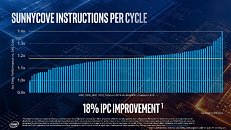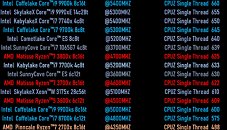Monday, June 17th 2019

Intel "Ice Lake" IPC Best-Case a Massive 40% Uplift Over "Skylake," 18% on Average
Intel late-May made its first major disclosure of the per-core CPU performance gains achieved with its "Ice Lake" processor that packs "Sunny Cove" CPU cores. Averaged across a spectrum of benchmarks, Intel claims a best-case scenario IPC (instructions per clock) uplift of a massive 40 percent over "Skylake," and a mean uplift of 18 percent. The worst-case scenario sees its performance negligibly below that of "Skylake." Intel's IPC figures are derived entirely across synthetic benchmarks, which include SPEC 2016, SPEC 2017, SYSMark 2014 SE, WebXprt, and CineBench R15. The comparison to "Skylake" is relevant because Intel has been using essentially the same CPU core in the succeeding three generations that include "Kaby Lake" and "Coffee Lake."
A Chinese tech-forum member with access to an "Ice Lake" 6-core/12-thread sample put the chip through the CPU-Z internal benchmark (test module version 17.01). At a clock-speed of 3.60 GHz, the "Ice Lake" chip allegedly achieved a single-core score of 635 points. To put this number into perspective, a Ryzen 7 3800X "Matisse" supposedly needs to run at 4.70 GHz to match this score, and a Core i7-7700K "Kaby Lake" needs to run at 5.20 GHz. Desktop "Ice Lake" processors are unlikely to launch in 2019. The first "Ice Lake" processors are 4-core/8-thread chips designed for ultraportable notebook platforms, which come out in Q4-2019, and desktop "Ice Lake" parts are expected only in 2020.
Source:
WCCFTech
A Chinese tech-forum member with access to an "Ice Lake" 6-core/12-thread sample put the chip through the CPU-Z internal benchmark (test module version 17.01). At a clock-speed of 3.60 GHz, the "Ice Lake" chip allegedly achieved a single-core score of 635 points. To put this number into perspective, a Ryzen 7 3800X "Matisse" supposedly needs to run at 4.70 GHz to match this score, and a Core i7-7700K "Kaby Lake" needs to run at 5.20 GHz. Desktop "Ice Lake" processors are unlikely to launch in 2019. The first "Ice Lake" processors are 4-core/8-thread chips designed for ultraportable notebook platforms, which come out in Q4-2019, and desktop "Ice Lake" parts are expected only in 2020.


153 Comments on Intel "Ice Lake" IPC Best-Case a Massive 40% Uplift Over "Skylake," 18% on Average
A big slide in their Computex presentation does not count as bragging?
For comparison, AMD had 2 numbers for Zen2 IPC increase for Computex - Cinebench (R20) 1T result was +13% and SPECint result that they eventually decided to use in the slide was +15%.
40% does come from Intel's slide. Apparently there is one (part of) benchmark that indeed does get 40%. Benchmarks run are listed underneath and there is a bunch of results averaged (well, geomeaned) to get that 18%.
Why exactly does Zen2 13-15% (based on 2 benchmarks) sound more possible than whatever Intel is claiming? Both are first party benchmarks more likely than not designed to show their own CPU in best possible light, both results come from benchmarks. AMD's results seem to be from a subset of the same benchmarks that Intel also ran.
In an interview, people from AMD said that they were expecting a regression in clock speeds when moving to 7nm (because of high leakage and other problems associated with new node so small), but they managed to avoid this and actually gain a few 100MHz. From what we've seen so far, Intel has yet to fix their 10nm node and are having trouble scaling the clock speeds and core counts.
The 40% number is most likely from a workload that makes heavy use of AVX512.
That can NOT be a mistake!
Now let's first check if it passes the smell test;
- The person making this have access to unreleased products from both AMD and Intel, including an early engineering sample of a 6 core Ice Lake, very unlikely.
- There is no CPU named "Sunny Cove", Sunny Cove is the core design, the first implementation is Ice Lake, so this is obviously wrong.
- Some of these clocks are fairly optimistic.
So most likely a fake.
And even if the benchmarks were accurate, >40% gain in a benchmark does not mean 40% higher "IPC". IPC should never be estimated based on a single workload, but a good selection of representative workloads. Even if Ice Lake truly yields 18% higher IPC, that doesn't mean every score will increase by 18% per clock, some may be only 5% while others are >40%, it all depends on which part of the CPU the benchmark stresses.~18% would be comparable to Sandy Bridge -> Skylake, which is no small achievement.
Performance loss from security mitigations are negligible for Skylake with later patches.7nm in large volumes will probably not ship until late 2021 or 2022.
Xeons based on Ice Lake-SP(10nm+) will ship in Q2 2020. HEDT have traditionally been based on the server platforms, and considering HEDT is low volume compared to mainstream, Intel could choose to release HEDT based on 10nm+, but nothing is confirmed so far.Skylake have no problem with core speed vs. Zen 2. Zen 2's advantage will be energy efficiency and density allowing for more cores, which is where Intel will be limited by their 14nm node. Intel's 6- and 8-cores will consume more energy than their Zen 2 counterparts, but will have no issues competing in other regards. It's when you go past 8-10 cores that Intel will face problems, which means they will have no direct competitor to 12-/16-core "mainstream" parts.
Even if 10nm was less troubled, they would probably still struggle to achieve higher clock speeds. The long-term expectations is actually lower clock speeds for upcoming nodes, so future progress will depend on IPC gains.
My biggest complaint about Intel's situation is the lack of a proper backup plan. If they had only backported Synny Cove to 14nm, they would have had a good performance gain and lead for the next two years in the mainstream segment.
.....actually... that was "real world gaming". Intel was responding to AMD's 'gaming CPUs' and challenged them on that front.
www.techpowerup.com/forums/threads/intel-challenges-amd-to-beat-it-in-real-world-gaming.256393/
pcper.com/2019/05/intel-pre-computex-gen11-9900ks/
o_O:laugh:
- We will give you "filter bubble" performance. If you use lots of Chrome, you get superb Chrome performance. In other words, the less common tasks are the ones they won't optimize much for? Or at least at the expense of the higher percentages? That is a painful departure from having the optimal CPU for every use case... wait... that is probably why I've bought Intel CPUs for performance rigs the past decade. Righto!
- What have they been doing stuffing IGPs in CPUs and taking up valuable real estate on the die for a piece that especially power users will NEVER look at? Hmmmmm. As far as I can tell, all we got was the same slab of silicon in twenty flavours every odd year. And it just so happened to do all the things better than the competition.
- Is the new Intel optimization process a trial and error run now? Some hardware mitigation here, some Chrome optimization there, oh people do streaming let's use the solid hardware we already had for years... what else? Higher clocks so they can surpass their own TDP rating within two seconds of load? Ooh shit this node doesn't work right, let's skip it after all. Oh no, wait, we'll do some 10nm anyway. Maybe. Someday.
Utterly
pathetic.
Get back in your corner, we don't want to play with you anymore. Oh and another thing, I use Firefox.